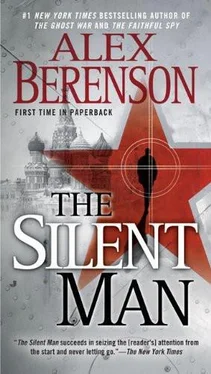Alex Berenson - The Silent Man
Здесь есть возможность читать онлайн «Alex Berenson - The Silent Man» весь текст электронной книги совершенно бесплатно (целиком полную версию без сокращений). В некоторых случаях можно слушать аудио, скачать через торрент в формате fb2 и присутствует краткое содержание. Жанр: Шпионский детектив, на английском языке. Описание произведения, (предисловие) а так же отзывы посетителей доступны на портале библиотеки ЛибКат.
- Название:The Silent Man
- Автор:
- Жанр:
- Год:неизвестен
- ISBN:нет данных
- Рейтинг книги:5 / 5. Голосов: 1
-
Избранное:Добавить в избранное
- Отзывы:
-
Ваша оценка:
- 100
- 1
- 2
- 3
- 4
- 5
The Silent Man: краткое содержание, описание и аннотация
Предлагаем к чтению аннотацию, описание, краткое содержание или предисловие (зависит от того, что написал сам автор книги «The Silent Man»). Если вы не нашли необходимую информацию о книге — напишите в комментариях, мы постараемся отыскать её.
The Silent Man — читать онлайн бесплатно полную книгу (весь текст) целиком
Ниже представлен текст книги, разбитый по страницам. Система сохранения места последней прочитанной страницы, позволяет с удобством читать онлайн бесплатно книгу «The Silent Man», без необходимости каждый раз заново искать на чём Вы остановились. Поставьте закладку, и сможете в любой момент перейти на страницу, на которой закончили чтение.
Интервал:
Закладка:

Alex Berenson
The Silent Man
For Jackie
There rose from the bowels of the earth a light not of this world, the light of many suns in one.
— The New York Times , September 26, 1945, describing the first nuclear testA small group of people, none of whom have ever had access to the classified literature, could possibly design and build a crude nuclear explosive device. They would not necessarily require a great deal of technological equipment or have to undertake any experiments. Only modest machine-shop facilities that could be contracted for without arousing suspicion would be required. The group would have to include, at a minimum, a person capable of searching and understanding the technical literature in several fields, and a jack-of-all-trades technician. Again, it is assumed that sufficient quantities of fissile material have been provided.
— United States Congress, Office of Technology Assessment, 1977PART ONE
1
Aweaker man would have found Shamir Taghi’s pain unbearable. The average American, used to popping Tylenol and Advil for every ache, would have found Shamir Taghi’s pain unbearable.
But Shamir wasn’t American. He was a Kazakh who lived in Russia, and he was fifty-eight years old, and he was dying of cancer. Lung cancer that had reached his bones. He felt as though he were being cut open from the inside out, tiny claws tearing apart his ribs.
Yet every day Shamir faced his pain. No morphine or hydrocodone for him. Those were expensive drugs, and he was a poor man. Instead he gobbled down aspirin, brought by his son Rafik from the pharmacy in Makushino in big white bottles with peeling labels. For all the good the pills did him, they might as well have been filled with sugar.
Before the cancer came, Shamir had been a strong man, 200 pounds, his muscles swollen by a lifetime of work. Now he weighed 140 pounds. He couldn’t eat, couldn’t bear to swallow. He couldn’t even smoke anymore, his only sin.
The pain. There were no words for it.
But it would be ending soon.
A week before, his son had brought a man to see him. A light-skinned Arab who came recommended by the imam of the local mosque. A quiet man, well schooled in the Book, which meant more and more to Shamir as his death approached. The man knelt on the concrete floor of Shamir’s apartment and took his hand.
“Father,” he’d said, and Shamir had looked at Rafik before realizing his mistake. “Father, do you want the Prophet to smile on you at your death?”
Shamir nodded.
“Then will you do something for me? For all Muslims?”
THE KAMAZ TANKER TRUCK roared down the two-lane road at sixty-five miles an hour, its driver’s-side wheels exactly on the centerline. A quarter-mile ahead, an oncoming Lada pulled to the side, giving the tanker plenty of room to pass. High in the cab of the Kamaz, Nikolai Nepetrov smiled as the Lada moved over. Nepetrov was used to playing highway chicken, and winning. What driver would take on a tanker loaded with eight thousand gallons of gasoline?
For five years, Nepetrov had run gas from the massive Sibneft refinery at Omsk to stations in Chelyabinsk, five hundred miles west. He was thoroughly sick of the trip. On maps, the Omsk-Chelyabinsk road looked like a four-lane highway. In reality the road was two lanes most of the way, clogged by army convoys that rattled along at thirty miles an hour. In fact, Nepetrov had been stuck behind a convoy this morning. He’d finally passed it a few miles back, on a short stretch where the highway really was four lanes.
The Lada disappeared behind him, leaving empty pavement ahead, two lanes with thick firs on both sides. Nepetrov popped in the clutch, downshifted, stomped on the gas. The hardy hum of the engine rumbled through the cab. He put his hands high on the truck’s oversized wheel and began to sing, loudly and well: Po ulitse mostovoi, shla dyevitsa za vodoi.
“Along the paved road, there went a girl to fetch water, there went a girl to fetch water, to fetch the cold spring water.” A Russian folk tune, one of his favorites. His voice echoed through the cab. “Behind her a young lad is shouting: ‘Lass, stand still! Lass, stand still! Let’s have a little talk!’”
Nepetrov felt a pleasant itch in his crotch as he imagined the young woman, wearing woolen tights against the cold. She held a wooden bucket as she bent over the well, her legs slightly apart. Perhaps when he dropped off this fuel he would reach into his pocket for a few hundred rubles, find a woman for his amusement. Though his lass would be wearing too much makeup and stink of all the other men she’d had that day.
Outside, thick gray clouds blocked the sun. The temperature had fallen since morning, the first real cold snap of the long Siberian winter. Nepetrov wore a hat and leather driving gloves. He preferred not to use his heater. The cold kept him awake. He put aside the lass with the bucket and slipped into a new song.
“Down the Volga, Mother Volga, over the wide sheet of water, there rises a thunderstorm, a huge thunderstorm. ”
The road was still clear, aside from a big tractor dragging a load of bricks toward him. Nepetrov upshifted and feathered the gas pedal, watching with satisfaction as the speedometer rose to 120 kilometers—75 miles — an hour.
“Nothing is to be seen on the waves, there is only a small black ship.”
SHAMIR GRIPPED THE WHEEL of the tractor, watching the big tanker truck rumble at him. Even the wind couldn’t soothe his burning bones. With every rut in the road, the claws inside him dug deeper.
Whatever came next, he’d be leaving this pain behind.
Five . The big truck was about three hundred meters away and steaming along. Shamir edged the tractor toward the center of the road, real estate that the truck had already claimed. “Now’s the time, father,” the Arab had told him a few minutes before, after getting a call on his mobile phone. “We’ll be with you. We’ll all be watching you.”
Four . The truck could have moved back into its lane to give Shamir room. Instead it veered toward Shamir, bearing down on him, trying to force him to the edge of the road. Its air horn fired a long blast in warning.
Three . Shamir pulled the tractor slightly to the right as if he were getting out of the truck’s way. The air horn blasted again.
Two. “Allahu akbar.” God is great. The words emerged in a whisper from Shamir’s ruined throat.
One . He twisted the wheel hard left.
“THERE IS ONLY a small black ship — NO!”
Suddenly the tractor blocked the road ahead. Nepetrov had only bad choices. Jerk the wheel hard left and skid into the trees. Stamp his brakes and jackknife the tanker behind him. He chose to do nothing at all, hoping that he might somehow smash the tractor into pieces and survive. Perhaps he would have, if not for the bricks the tractor was hauling.
The crash killed Shamir instantly. Nepetrov wasn’t so lucky. The force of the collision split the cab from the tanker. The cab rolled forward, and for a wild moment Nepetrov saw the pavement coming up at him through the windshield. Then the cab flipped onto its side, bouncing down the road, breaking apart. It trailed metal and glass and coolant for seventy-five feet before finally it stopped.
Behind the cab, the tanker slid forward, its undercarriage grinding against the road, kicking up a sea of sparks. It smashed into the back of the cab and stopped. For a moment the two pieces of the truck rested beside each other, a parody of the vehicle they had once been.
Читать дальшеИнтервал:
Закладка:
Похожие книги на «The Silent Man»
Представляем Вашему вниманию похожие книги на «The Silent Man» списком для выбора. Мы отобрали схожую по названию и смыслу литературу в надежде предоставить читателям больше вариантов отыскать новые, интересные, ещё непрочитанные произведения.
Обсуждение, отзывы о книге «The Silent Man» и просто собственные мнения читателей. Оставьте ваши комментарии, напишите, что Вы думаете о произведении, его смысле или главных героях. Укажите что конкретно понравилось, а что нет, и почему Вы так считаете.












